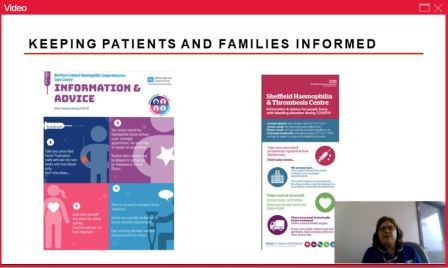SUZANNE O'CALLAGHAN
Suzanne O'Callaghan is HFA Policy Research and Education Manager
Moderator: Deon York, Board Member, World Federation of Hemophilia; President of the Haemophilia Foundation of New Zealand

The session on what quality of life means to you at the Virtual Summit took us on an exploration of the challenges and motivations that impact on quality of life, both for the person with a bleeding disorder and the health professionals who care for them. I found it to be an honest, thoughtful and sometimes confronting journey as the presenters gave their individual perspectives on quality of life. The session also took into account the effect of COVID-19 and the complexities of this experience. Cathy Harrison’s presentation, for example, highlighted the positive and negative outcomes of this pandemic. Overall it left us with a strong message: what defines each person’s quality of life will be individual to them and it is important to ask them and not make assumptions.

Nathalie Roussel, Assistant Professor, Musculoskeletal Physiotherapy, University of Antwerp
How we think about our health affects how we feel. This seems like a simple statement, but Natalie Roussel explained just how complex this can be in relation to bleeding disorders and quality of life. Using the example of pain, she described how the negative emotions like fear and anxiety can affect a person’s experience of pain and will affect their entire day. Current research has underlined that this way of thinking is ‘plastic’; that it can be changed into a more positive way of thinking about and experiencing pain.
In haemophilia, joint problems such as target joints will reduce quality of life over a lifetime. Although it might seem counter-intuitive, it has been found that increased physical activity may help to improve pain. Natalie pointed out that overcoming a fear of movement in people with haemophilia would not only decrease their pain but also increase their sense of self-efficacy. Stress management may help them to have better coping strategies. All of these come together to improve quality of life.
Cathy Harrison, Advance Nurse Practitioner, Sheffield Haemostasis & Thrombosis Centre

Cathy Harrison gave an interesting personal view of the COVID-19 crisis from her perspective as a haemophilia nurse. She began by pointing out the effect of COVID-19 on mental health and on those who are more vulnerable in the community. In early surveys in China, although many people did not feel personally at risk from COVID-19, they nevertheless reported generalised feelings of apprehension and horror about COVID-19.
Managing the stress of COVID-19 for her patients was very important to Cathy. At the beginning of the pandemic in the UK, the HTCs were concerned to make sure services were maintained to people with bleeding disorders and worked together as a team to achieve this. The process was exhausting, especially as the team was slowly separated through redeployment and illness. Even when she herself contracted COVID-19, Cathy continued to work from home to support the HTC team. They realised that it was crucial to keep their patients informed to reduce feelings of anxiety about their access to services. The HTCs remained open for acute episodes and maintained contact with their patients through telephone, email and videohealth services. They offered support to surgical teams for urgent surgery, even though this was more difficult than usual as they could not see the patient face-to-face.
What will be important for the future? Cathy underlined that it will be essential not to make assumptions about patient preferences and to find out from their patients what has worked well and how they would prefer to receive their services.
Lauren Phillips, Youth Committee Member, Haemophilia Foundation of New Zealand
Lauren is a woman living with moderate/severe type 1 von Willebrand disease (VWD). She took viewers on a quick journey on her life and experience and what is important to her as a patient. She stressed that it was her personal perspective and others will have their own voice and experience.
She was not diagnosed until she was 8 years old in the UK, after years of severe nosebleeds and anaemia. At first her parents were told she might have leukaemia, and after the great fear this caused, they were relieved to find it was actually VWD. For Lauren, this was a lesson that she needed to be well-informed about her health condition and to be able to work closely with her medical team to spare her parents more anxiety about her health. When she and her family emigrated to New Zealand, she was put on home therapy and reflected that access to good quality treatment was very important to quality of life.
When she left home to go to university, she was for the first time in charge of her treatment and treatment plan. At this point in her life she was referred to a gynaecologist and diagnosed with endometriosis. Being treated for her endometriosis made an enormous difference to her menstrual bleeding and pain and changed her beliefs about her potential to be in a relationship and have children. This also highlighted for her that there could be other medical complications with her bleeding disorder.
With her improved quality of life, she felt she had more to offer and joined the Youth Committee at HFNZ. This has meant that she has connected with other people with bleeding disorders internationally and has been a very positive experience for her. A big issue for her has been disclosing her bleeding disorder, particularly to new partners. For her, disclosing was a way to find a partner that would accept her and her bleeding disorder. She is now married and considering starting a family with her husband.
Summing up, Lauren underlined that ‘quality of life’ means different things to different people and that it is important for clinicians and community members to ask individual people with bleeding disorders what ‘quality of life’ means to them.

Randall Curtis, Project Manager, Hemophilia Utilization Group Study (HUGS)
Randall Curtis has severe haemophilia has been involved in research to measure patient experiences for many years. He highlighted what he called the ‘disability paradox’: that in spite of joint problems and pain over their lifetime, older people with haemophilia often score higher on quality of life measures than people the same age with similar health conditions like osteoarthritis. Researchers believe this is because older people with haemophilia have had arthritis and pain since they were young and have adapted to it. Their frame of reference is other people with haemophilia who are their age. As a result, the types of measures used in assessing health may under-report their problems with activities of daily living. Randall concluded that it will be critical to quality of life research in haemophilia to also use measures that can describe actual everyday functioning and issues such as joint problems and pain and can reflect the impact of changes in care.
Haemophilia Foundation Australia acknowledges the Traditional Owners and Custodians of Country throughout Australia, the land, waters and community where we walk, live, meet and work. We pay our respects to Elders past and present and extend that respect to all Aboriginal and Torres Strait Islander peoples.
Sign up for the latest news, events and our free National Haemophilia magazine